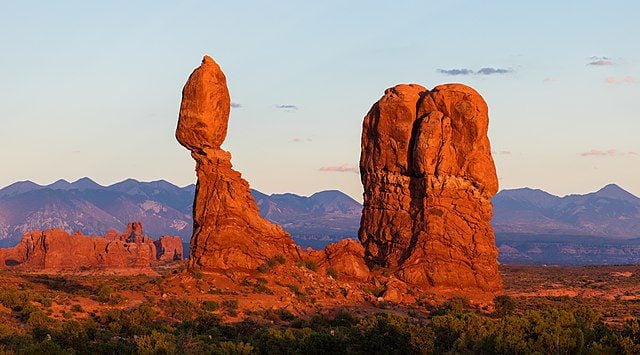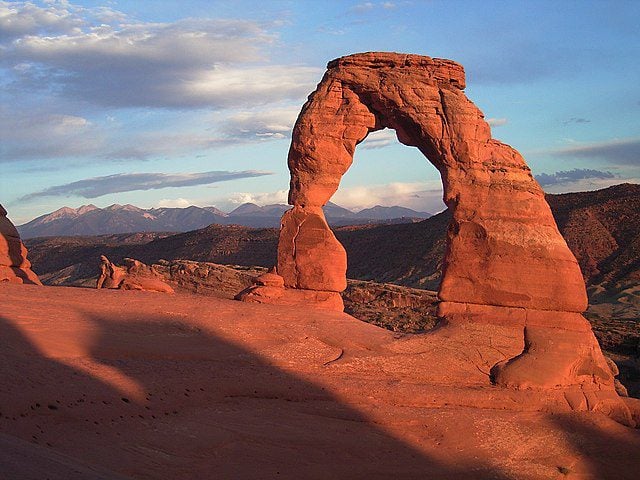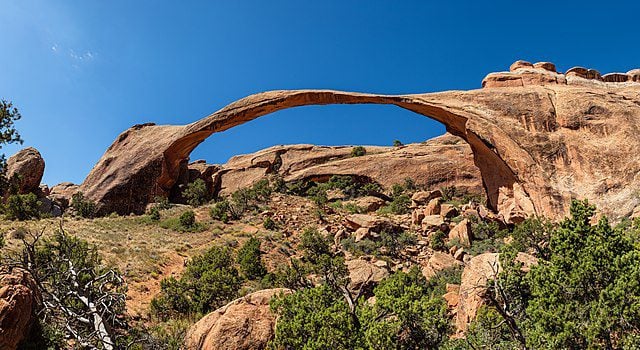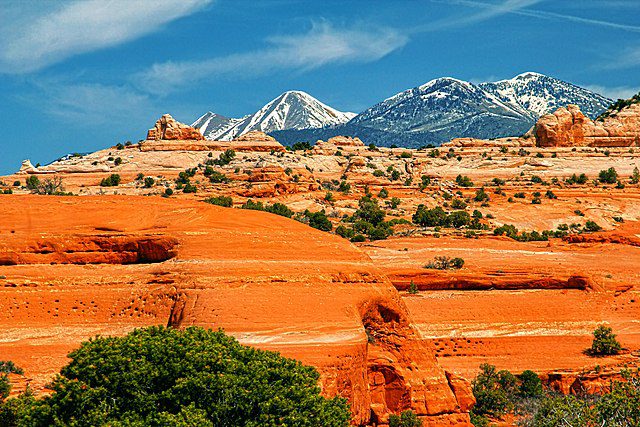
After our friend and her two young daughters left for home, my wife and I spent the late afternoon and early evening in nearby Arches National Park, where we enjoyed a variety of spectacular and almost otherworldly landscapes. I have to say that my adopted home state offers some truly remarkable vistas. The colors were magnificent as the sun began to set in the west; they change constantly throughout the day, making it worthwhile to come in the morning and in the evening and in between.

(Wikimedia Commons public domain image)
I’ve just run across a review of a new book from a prolific Catholic thinker whom I’ve enjoyed over the years: “Making God Laugh: A new book makes the case that humor is heavenly.”
For some reason, the review reminded me of a comment from Brigham Young: “There is no music in hell,” he once said, “for all good music belongs to heaven.” And it’s true that a recurring theme in a substantial minority of reports of near-death experiences is that of incredibly beautiful music. I wonder, though, whether Brigham’s confident statement is entirely true: After all, wouldn’t hell be a wonderful place for bad music? Personally, I believe that I’ve had repeated direct and personal experiences with hellish music. To cite just one instance, the interminably long “It’s a Small World” ride at Disneyland, in Anaheim, California, offers a harrowing foretaste of an eternity of excruciating torment for all those with ears to hear. (For those who lack ears to ear, though, it’s probably pretty much harmless, and the line moves really fast.)
But the review also reminded me of something else: I was the founder and, for years, the editor-in-chief of Brigham Young University’s former Middle Eastern Texts Initiative, which, a few years after my enforced departure from the project, was transferred by the Maxwell Institute to E. J. Brill Publishing in the Netherlands. The Middle Eastern Texts Initiative (METI) produced bilingual editions of books (mostly Islamic, but also sometimes Eastern Christian and Jewish) from the classical Islamic world. The books were printed at Brigham Young University Press and distributed by the University of Chicago Press.
Anyway, one of the volumes features what I still consider the best single line that we ever published. But, first, just a tiny bit of prefatory material:
Al-Ghazālī (d. AD 1111), who was one of the most significant figures in the history of Islamic thought, a legendarily brilliant philosophical theologian and legal thinker who spent most of his life in Iran and Iraq but also sojourned for a significant period in Jerusalem, is talking about extremely poor students, and, in that context, attributes the following remark to Jesus:
“Even though I managed to raise the dead, I have never been able to cure an idiot!”
(See al-Ghazālī, “O Son!,” trans. David C. Reisman, in Classical Foundations of Islamic Educational Thought, ed. Bradley J. Cook [Provo, UT: Brigham Young University Press, 2010], 103.)
Now, I’ll admit that my first inclination when I came across the passage was to say that this alleged statement can’t possibly be authentic. And that’s still probably correct. But al-Ghazālī is entirely serious, and plainly regards the statement as genuine. Furthermore, his citation of it takes us back fully a thousand years or more, halfway to the time of Jesus. So . . .
I have to confess that I rather like the idea that the Savior might have said such a thing. It humanizes him a bit. Surely, with all those long walks from Nazareth to Capernaum, and from Capernaum to Jericho, and from Jericho to Jerusalem, and from Jerusalem back up to Capernaum or Nazareth, it can’t all have been immortal sermons and solemn earnestness. (Can it? Maybe I’m just not fit for heaven.) There must have been some small talk. And the image of Jesus trudging along with the disciples down those dusty paths and confiding, at the end of a tough day, “You know, Peter? I can raise the dead, but I just can’t cure idiots” is oddly appealing to me.
Still, alas, it’s probably bogus.
Here are a couple of other cases, though, where I think that an impish divine sense of humor may actually play a role. Both are instances where, if my hypotheses are on target, the prank was set in place long before it was noticed:
1) The appearance of Elijah in the Kirtland Temple: “Elijah did come at Passover time — as pious Jews had long hoped he would — although he did not avail himself of the hospitably opened door of a faithful Jewish family but came to the House of the Lord in Kirtland.” See Stephen D. Ricks, “The Appearance of Elijah and Moses in the Kirtland Temple and the Jewish Passover,” BYU Studies 23/4 (1983): 483-486. Neither the early Latter-day Saints nor anybody else noticed for several decades. When they do notice, though, it becomes one of those things about Joseph Smith that are rather difficult to explain.
2) The appearance of Early Modern English (EModE) in the original English dictation of the Book of Mormon. Once again, though, neither the early Latter-day Saints nor anybody else noticed for several decades. And, also once again, it becomes difficult to explain away. It’s very strange for believers, but, for those who seek a naturalistic explanation for the appearance of the Book of Mormon in the late 1820s, it’s virtually impossible.

(Thomas Wolf, www.foto-tw.de)
“Water, water, water….There is no shortage of water in the desert but exactly the right amount , a perfect ratio of water to rock, water to sand, insuring that wide free open, generous spacing among plants and animals, homes and towns and cities, which makes the arid West so different from any other part of the nation. There is no lack of water here unless you try to establish a city where no city should be.”Desert Solitaire: A Season in the Wilderness)

(Wikimedia CC photo by Betty Wills)
Posted from Moab, Utah












